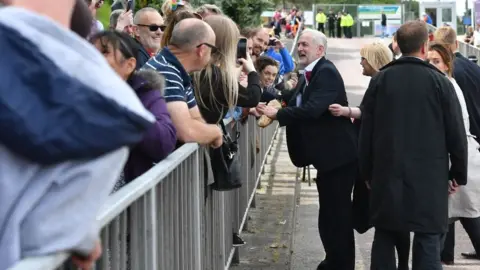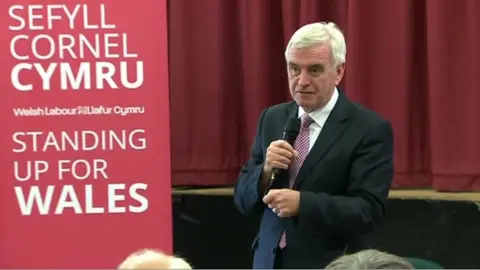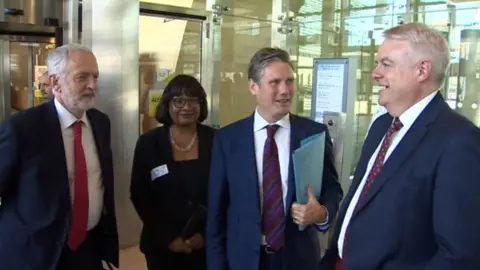The state of the parties in Wales: Welsh Labour
 BBC
BBCIn the first of several features on where Wales' parties stand two months on from the general election, BBC Wales political editor Nick Servini looks at Welsh Labour.

It should be a strangely relaxing holiday period for Labour without a summer leadership contest for the first time in three years.
When I mentioned that to the shadow chancellor John McDonnell on a recent visit to Pembrokeshire, he gently suggested that someone needed to have a word to remind Jeremy Corbyn.
The sense was that the Labour leader had no such intention of taking his foot off the gas in the wake of the general election result, even if many in his party probably felt like a long break.
Mr McDonnell was actually in the constituency of Preseli Pembrokeshire as part of a summer tour of marginals.
The fact that it is now even considered a marginal, after the former Welsh Secretary Stephen Crabb clung on in what was considered a safe Tory seat with a majority of just 314 votes, tells you all you need to know about how the party surprised so many in June.

The overall result may not have put Mr Corbyn into Downing Street but it gave the party rocket boosters, although the celebrations were muted among many Labour MPs who, ironically, saw their majorities increase off the back of the popularity of a leader they had previously criticised.
In truth, there were Labour politicians and party members as surprised as anyone in the way the campaign turned out.
Be that as it may, Labour now feels emboldened in the way it approaches certain issues like austerity and the state of the public finances.
On paper at least, the same should apply to Brexit but there is a sense that, like the Conservatives, divisions are never far from breaking out.
The latest strategy from the party is to focus on the one thing they can all agree on - the need for tariff-free access to the single market.
John McDonnell said everything else is secondary. As a strategy, this has the benefit of potentially closing down the significance of any different nuances on the approach to Brexit among senior figures.
The downside is that it says so little that Labour loses impact and credibility whenever it wants to launch into a criticism of the UK government's approach to the negotiations.
There are some, including the former shadow Europe minister Wayne David, who believe the party should be using the summer to come up with a cohesive approach to EU withdrawal before the autumn conference.
In the meantime, the hope will be that splits among Conservative ranks outweigh any divisions within Labour.

First Minister Carwyn Jones has also looked to cash in on the unexpected strength of Labour and comparative weakness of the UK government since the June result.
He has been particularly prominent in his criticism of the way that EU powers covering devolved areas are due to be temporarily held at Westminster immediately after Brexit.
Mr Jones believes barriers to trade will hit the Welsh economy disproportionately, and he clearly feels the election result has given him a stronger mandate to push those views aggressively on a UK government that at times has looked at sixes and sevens.
In all of this, the performance of the Labour government in Cardiff in the delivery of public services has faced far less attention than would otherwise have been the case.
Waiting times still lag behind England in most areas but the performance appears to have broadly stabilised.
 Welsh Government
Welsh GovernmentMuch of the scrutiny has been on economic development with the decision not to support the Circuit of Wales racetrack in Blaenau Gwent.
There will now be pressure on Labour ministers to deliver alternative proposals with the possibility of creating other jobs in the Heads of the Valleys.
And there are some big decisions on the horizon as the public inquiry into the M4 relief road at Newport nears its end, and a decision is made on who operates the new Wales and borders franchise.
And as the recess gets under way, Welsh Labour will have time to reflect on its relationship with a man who help provide it with much improvement at the ballot box, and yet is a man who it has very much tried to keep at arms length: Jeremy Corbyn.
